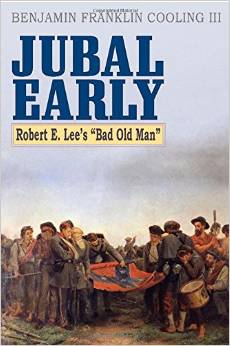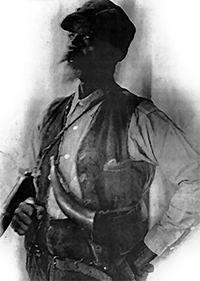Jubal Early: Robert E. Lee’s “Bad Old Man” by Benjamin Franklin Cooling III. Rowman & Littlefield Publishers, 2014. Cloth, IBSN: 978-0810889132. $38.00.
 “My bad old man,” as Robert E. Lee once referred to Confederate General Jubal Anderson Early, is perhaps a fitting nickname, given Early’s wartime propensity for profanity and his vitriolic temper. Though frequently not on the best terms with his subordinates and at times given to cast blame on them without significant justification, Early usually achieved the desired objectives on the battlefield, especially as a brigadier and then as a division commander. He developed a reputation as a hard-hitting, aggressive leader who often got the most out of his men. And yet, when given independent command in 1864, Early’s performance was mixed. Some admirers extol his efforts in the Shenandoah Valley as extending the Confederate war effort; others point to tactical errors at Cedar Creek and other battles as limiting his possible success. Eventually Lee’s confidence in him waned, and Early spent the latter days of the war without a formal command. After the war, Early became perhaps the leading advocate of the “Lost Cause” movement, regarding the Southern cause as a noble one which fell only because of overwhelming Northern resources and industrial might.
“My bad old man,” as Robert E. Lee once referred to Confederate General Jubal Anderson Early, is perhaps a fitting nickname, given Early’s wartime propensity for profanity and his vitriolic temper. Though frequently not on the best terms with his subordinates and at times given to cast blame on them without significant justification, Early usually achieved the desired objectives on the battlefield, especially as a brigadier and then as a division commander. He developed a reputation as a hard-hitting, aggressive leader who often got the most out of his men. And yet, when given independent command in 1864, Early’s performance was mixed. Some admirers extol his efforts in the Shenandoah Valley as extending the Confederate war effort; others point to tactical errors at Cedar Creek and other battles as limiting his possible success. Eventually Lee’s confidence in him waned, and Early spent the latter days of the war without a formal command. After the war, Early became perhaps the leading advocate of the “Lost Cause” movement, regarding the Southern cause as a noble one which fell only because of overwhelming Northern resources and industrial might.
Jubal Early never reached the level of public adoration and recognition that Lee, Stuart, Jackson, and others did, yet he remains a very important figure in the Confederate war effort. It is somewhat surprising, however, given his wartime status, frequent writings, and long public history that he has not garnered more attention from postbellum biographers. Several highly regarded authors such as Gary W. Gallagher and John D. Cox have written in detail on certain aspects of his life and career, though it was not until 1992 that a full length study of Early’s life was published. More recently, other books have appeared which cover Early to some extent, including several of his brigades in the Gettysburg campaign. Recently, Benjamin Franklin Cooling III, known mostly for his extensive writing on Early’s 1864 raid on Washington, D.C., has written a new biography, appropriately titled, Jubal Early: Robert E. Lee’s “Bad Old Man.”
Published by Rowman & Littlefield, Cooling’s book is rather brief (checking in at less than 200 pages) and should best be regarded as an overview of Early’s life and major activities. It is neither an exhaustive review nor a deeply interpretive work, but it does fill a useful niche in the historiography of Lee’s key subordinates. Cooling himself states “this is not a complete biography. It does propose a critical, focused analysis of a legend and a reality for our times.” He divides the book into seven chapters. In the first, “Making a Piedmont Soldier, Lawyer/Reluctant Secessionist,” Cooling gives a broad introduction to Early and the antebellum factors that influenced him and shaped his later views. The meat of the book, of course, covers the Civil War years and Early’s role in shaping the Lost Cause issue. In chapter 2, Cooling discusses Early’s keen desire to prove himself on the battlefield and as leader. The next chapter, “Seeking Stonewall’s Ghost,” gives an account of the Gettysburg campaign and the early part of 1864. Perhaps too brief at only 17 pages, it does set the stage for Cooling’s comparatively deeper analysis of Early’s independent command in the Valley (in what he deems as “Jubal’s Moment of Truth: The Washington Campaign”).
It is here and in the following chapters that Cooling is the most comfortable, given his previous body of work on the aborted Confederate attempt to attack the defenses surrounding Washington City. His accounts of Early’s movements are concise and informative. He postulates that Early at his weakest moment blinked instead of storming Fort Stevens, but could another general have succeeded – Breckinridge, Gordon, Longstreet, or others? Cooling raises the question, but does not attempt within the scope and length of the book to answer it in any detail other than to suggest “possibly yes; probably not!”
Chapter 5 covers “Lee’s Forlorn Hope: The Shenandoah Nadir,” what became known to history as the Valley Campaign of 1864. Covered in depth by numerous authors such as Jeffrey Wert and Scott Patchan, Cooling does not attempt to dive deeply into the complex command decisions and actions of Early and his subordinates, particularly John Brown Gordon. He does deal in some depth with the futile attempts by Virginia’s Governor, William “Extra Billy” Smith, long an Early enemy and a controversial former subordinate from Antietam to Gettysburg, to have Lee remove Early from command. Cooling queries, “Were Lee, Seddon, and Davis in error? Was this the moment that the Confederacy would have been better served by replacing Jubal Early? And who would the proper replacement have been—Breckinridge, John B. Gordon, or someone else, like [Richard H.] Anderson?” He wisely asks the obvious question about removing Early at that stage of the campaign: “Would it have made any difference given the momentum of events?” Phil Sheridan and his powerful force would likely have eventually defeated any number of replacements Lee could have sent into the Valley, unless “some Fabian-like tactic a la George Washington bought more time in the valley.”
Chapter 6 deems Jubal Early the “Unrepentant Apostle of the Lost Cause,” a fitting title for the erstwhile Confederate general. In many ways, this and the subsequent chapter is the apogee of the book. Cooling correctly suggests that Early “pecked away at preparing memoir reflections—always in pursuit of the truth by his own definition.” And that was the gist of the postwar Jubal Early: interpreting not only his own actions, but those of the Confederate high command and the Cause itself within the framework of his own scope and desires, often casting fault on others while deflecting criticism and blame from Robert E. Lee. He “reflected bias toward virtually everything and all who did not fit his paradigm. His speeches and correspondence reflect a crabbed man and spirit, crippled as much by perspective as ailment.” Cooling’s prose here shines as he explores the antebellum Early’s motives and results.
The final chapter is a fine discussion of Early’s place in American memory and in the pantheon of Confederate leaders, and in particular how Early has been compared by Gallagher and others to the legendary Stonewall Jackson. After relating an incident in which Early responded to Jackson’s criticism of the many stragglers in the rear of Early’s division by mocking that Stonewall only saw them because he himself “rode in the rear of my division,” Cooling’s penchant for descriptive words again shines. “Here was the penultimate Jubal Early—irreverent, practical, businesslike, and perhaps harboring arthritic pain that may ultimately best explain Early’s attitudes, actions, and crosses to bear across the years between then and now.”
While the penultimate Jubal Early biography has yet to be written, Benjamin Cooling’s new book is a worthwhile read for anyone seeking an overview of the famed Confederate general and postwar apologist. Entertaining, well written, and fast-paced, it will leave inquisitive readers wanting to explore the many primary and secondary sources the author presents in his extensive bibliography. To that end, Cooling has succeeded in whetting our appetites for even more of “Lee’s Bad Old Man.”
Scott L. Mingus, Sr., is the author of several books on Early’s Division, including Flames Beyond Gettysburg: The Confederate Expedition to the Susquehanna River; Confederate General William “Extra Billy” Smith: From Virginia’s Statehouse to Gettysburg Scapegoat; and The Louisiana Tigers in the Gettysburg Campaign.
